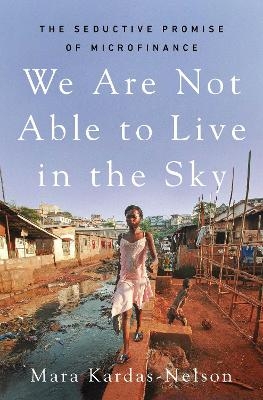
We Are Not Able to Live in the Sky
The Seductive Promise of Microfinance
Seiten
2024
St Martin's Press (Verlag)
978-1-250-81722-8 (ISBN)
St Martin's Press (Verlag)
978-1-250-81722-8 (ISBN)
For readers of Matthew Desmond, Katherine Boo, and Anand Giridharadas comes a deeply reported work of journalism that explores the promise and peril of global microfinance, told through the eyes of those who work in microfinance and women borrowers in Sierra Leone, West Africa.
In 2005, pop star Bono proclaimed, "Give a man a fish, he'll eat for a day. Give a woman microcredit, she, her husband, her children and her extended family will eat for a lifetime." By the mid-2000s, it had become international development dogma that microfinance - very small, high-interest loans - was the way to end poverty. The UN had dubbed 2005 the year of microcredit. A year later, when Muhammad Yunus won the Nobel Peace Prize for his work on microfinance, he proclaimed that tiny loans would "put poverty in museums."
It was a beautiful vision. But there was just one problem: microfinance doesn't work - at least not as promised.
Mara Kardas-Nelson's We Are Not Able to Live in the Sky is a story about unintended consequences, blind optimism, and the decades-long ramifications of seemingly small policy choices that reverberate around the world. It is a story of poor women doing their best to make ends meet under the toughest circumstances, and of international development workers, funders and advocates - from Bono to Bill Gates to Bill Clinton - who promise a brighter future with a quick-fix solution that may ultimately trap poor people in poverty. The book is deeply rooted in the deeply immersive narratives of women who take out microfinance loans in Sierra Leone; their stories are set against a detailed history of the meteoric rise of Muhammad Yunus' lofty vision and the gradual shift from a small non-profit program to a booming for-profit industry. We Are Not Able to Live in the Sky puts in harsh relief the questions we all should have been asking for decades: who makes money off microfinance - and more importantly, who, and what, gets left behind?
In 2005, pop star Bono proclaimed, "Give a man a fish, he'll eat for a day. Give a woman microcredit, she, her husband, her children and her extended family will eat for a lifetime." By the mid-2000s, it had become international development dogma that microfinance - very small, high-interest loans - was the way to end poverty. The UN had dubbed 2005 the year of microcredit. A year later, when Muhammad Yunus won the Nobel Peace Prize for his work on microfinance, he proclaimed that tiny loans would "put poverty in museums."
It was a beautiful vision. But there was just one problem: microfinance doesn't work - at least not as promised.
Mara Kardas-Nelson's We Are Not Able to Live in the Sky is a story about unintended consequences, blind optimism, and the decades-long ramifications of seemingly small policy choices that reverberate around the world. It is a story of poor women doing their best to make ends meet under the toughest circumstances, and of international development workers, funders and advocates - from Bono to Bill Gates to Bill Clinton - who promise a brighter future with a quick-fix solution that may ultimately trap poor people in poverty. The book is deeply rooted in the deeply immersive narratives of women who take out microfinance loans in Sierra Leone; their stories are set against a detailed history of the meteoric rise of Muhammad Yunus' lofty vision and the gradual shift from a small non-profit program to a booming for-profit industry. We Are Not Able to Live in the Sky puts in harsh relief the questions we all should have been asking for decades: who makes money off microfinance - and more importantly, who, and what, gets left behind?
Mara Kardas-Nelson is an independent journalist focusing on international development and inequality. Her award-winning work has appeared in The New York Times, The Nation, NPR, The Guardian and elsewhere. Mara has also spent years working in global health. Originally from the U.S., she has also lived in Canada, South Africa and Sierra Leone. Her time in different parts of the world informs the questions she asks, and how she frames her stories.
| Erscheinungsdatum | 23.05.2024 |
|---|---|
| Verlagsort | New York |
| Sprache | englisch |
| Maße | 155 x 236 mm |
| Themenwelt | Sozialwissenschaften ► Soziologie ► Makrosoziologie |
| Sozialwissenschaften ► Soziologie ► Spezielle Soziologien | |
| Wirtschaft ► Betriebswirtschaft / Management ► Finanzierung | |
| Wirtschaft ► Volkswirtschaftslehre | |
| ISBN-10 | 1-250-81722-6 / 1250817226 |
| ISBN-13 | 978-1-250-81722-8 / 9781250817228 |
| Zustand | Neuware |
| Haben Sie eine Frage zum Produkt? |
Mehr entdecken
aus dem Bereich
aus dem Bereich
deutsch-jüdische Lebensgeschichten
Buch | Hardcover (2024)
Wallstein Erfolgstitel - Belletristik und Sachbuch (Verlag)
CHF 67,20
queere Heldin unterm Hakenkreuz
Buch | Hardcover (2023)
Kremayr & Scheriau (Verlag)
CHF 33,55


